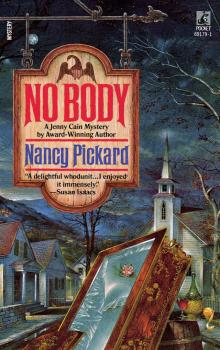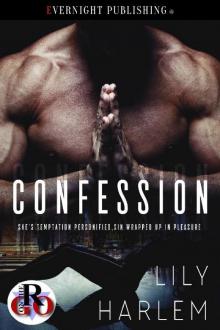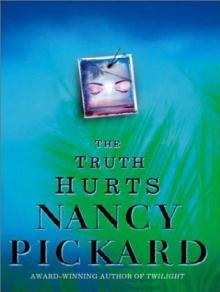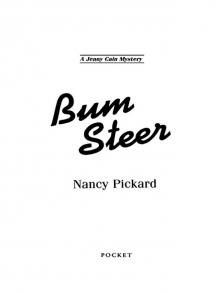- Home
- Nancy Pickard
The Blue Corn Murders Page 23
The Blue Corn Murders Read online
Page 23
“And Jon didn’t say,” Bingo persisted, “ ‘Oh, hey, Naomi, my wife’s coming along for the hiking tour’? He never said that to you?”
“No, he would have made the reservation for her—”
Genia interrupted. “Naomi, I took something from Susan’s house that I thought you might need sooner than the police would give it back to you.”
Bingo raised her eyebrows and grinned. “Why, Eugenia Potter!”
“I’ll go get it.”
When she returned, she placed a manila folder in Naomi’s hands. “I guess Jon was working on reservations for future trips.”
Naomi opened the folder and looked through it, then held up the paper that Genia had seen: the list of names and addresses and dates. She laid the Neiman-Marcus catalog aside and Genia noticed only then that little white pieces of paper were sticking out of it, as if somebody were planning on ordering items.
“These aren’t our program dates.” Naomi looked bewildered. “And I know some of these people—they’ve been on recent tours. But these addresses are not where they live. These addresses are all in Denver, but these people are not even from Denver, any of them.”
Naomi looked from face to face.
“What is this?”
Genia looked at the list, and then at the copies of the reservation cards. She picked up the Neiman-Marcus catalog and leafed through it, and she thought about the big pile of other catalogs on Jon’s side of the bed. She recalled her son’s dictum about computers: “Mom, it will pay off. You’ll begin to chart patterns and trends over a period of years.” Genia didn’t need a computer to see the pattern that was unfolding here. And she said to them:
“I think it has to do with my expiration date.”
Thirty-six
Saturday afternoon the impossible, the miraculous happened.
“They’ve been sighted! They’ve been found! The vans are coming in!”
The incredible news went up from person to person like sparks lighting the gloom. Stunned, half-disbelieving, weeping with relief and joy, everyone on campus seemed to go wild at once. Generators began to hum as television cameras got switched on. The on-air talent ran combs through their hair, in anticipation of covering the return live.
“Is it true? Is it true?”
It was true, and the truth became a parade—led by highway patrol cars with their lights flashing, and filmed overhead by jockeying helicopters, and followed by cars, trucks, motorcycles. Everything that had a horn was honking like mad for the sheer joy of it.
And cuddled safely amid it all, carried tenderly—if loudly—home like nineteen precious jewels on three golden pillows were sixteen dirty, smelly teenagers and three grimy adults, staring out of their van windows in sheer openmouthed amazement.
Seated right behind Jon Warren in the first van, Hiroshi Hansen asked him, “So, Jon, do you do this for all your tours?”
At that, Jon got the giggles and laughed so hard, the kids had to yell at him to keep driving straight.
Above them, a radio reporter said to his listening thousands, “My God! The lead van just swerved nearly off the road! Is the driver ill? Are the children safe, even now?”
In the lead van the kids were listening to the radio. Slowly they were getting a glimmer of what the fuss was all about and just how very much fuss there was. When they’d driven through the first little town after coming down from their canyon hideaways, the people on the streets had pointed at them and screamed, “It’s them! It’s them!” Soon a police car had pulled them over, and an excited cop had asked them questions, and then the highway patrol for one state had arrived to tell them not to say anything more to anybody and that he would accompany them from that point on. And now the highway patrol for Colorado had taken over. The whole world had thought they were missing, maybe even dead. They grasped that a massive search had been under way for three days. They were astonished. At first they thought it was funny and rolled about on each other in the laughing camaraderie they had achieved in their six days and five nights together in the wilderness.
But then something began to dawn on some of them, and then all of them.
“My mom!” One of the girls, full of the emotions of the recent, arduous, challenging, voyage into self-discovery, burst into tears. “Oh, my poor mom!”
“Hurry!” the teenagers urged their drivers. “We have to see our parents! We have to show them we’re okay. Drive faster! Damn those cops! Drive over the top of them, Jon!”
He responded by taking advantage of the unique opportunity to lie on the horn and tailgate a highway patrol car. It brought the whole procession to a halt, which sent the hovering journalists into a frenzy of surmise.
“What’s the problem, Mr. Warren?”
“Can we go any faster? The kids are anxious to see their folks.”
But the plea was to no avail; at a safe, sedate, exact fifty-five miles per hour, the long parade carried home the children the nation had been losing sleep over. Nothing would rush their caretakers now, not if even one extra mile per hour might endanger a single greasy hair of their unwashed heads.
Martina Alvarez stood, at her usual rigid attention, on the steps to meet the prodigals, her entire board of trustees behind her.
A great cheer went up as the first golden van nosed through the gate. The vans were rushed then, swarmed by weeping, smiling parents, so that the occupants could barely manage to get out. One of the girls reached through an open window to her parents, and her father grabbed her and pulled her right out of the van into his embrace.
The three adult drivers were the last to alight onto the gravel.
At their appearance, a semisilence descended on the crowd.
Jon Warren seemed to look around for someone, but then walked smilingly toward Martina and the other trustees.
She stopped him with an upraised arm, a pointed finger, and an outraged question:
“Where have you been?”
He looked at her as if she were speaking another language. “We’ve been exactly where we were supposed to be, Mrs. Alvarez. Exploring sites in northern Utah—”
“Utah!”
The cry went up from the listening crowd. “Utah!? But they were supposed to be in Colorado; we’ve been looking for them all over Colorado!” In truth, the search had covered several states, including Utah, but it was a huge state with many, many isolated, nearly invisible places. A group of nineteen people might have wandered unobserved for a very long time.
“Yes, Utah,” Jon said with a frown, as if they were all being obstinately dense. “Following the last schedule Naomi gave us.”
Martina Alvarez knew in that moment that she had failed to follow her own best counsel: She had taken Naomi O’Neal’s word for the purported whereabouts of the three vans.
Behind her, the real president of the board of trustees knew it, too, and he sensed a chance that might never come again. Stepping forward, he said calmly, “I’ll take over from here, Martina.” He beckoned to Jon. “Come on up. We need an executive director, and we need him now.”
As the celebration continued, the explanation seeped out.
The very morning of the trip, Jon had been handed a new schedule by Naomi. It was one that would take the kids into isolated pockets of Utah. They would stage the “abandonment” at Red Palace Ruins, but they would not return for the seminar with the ladies. Having a long drive to Utah ahead of them, they would get going on that instead. Jon had had to leave the kids and their teachers at the first exploration site while he drove back into Cortez to purchase brand-new sleeping bags for the staging, and new water bottles and backpacks, too, all at Medicine Wheel’s expense, which sounded absolutely outrageous to everyone who heard about it.
“What a waste of money!”
“Imagine leaving inexperienced adults in charge of those kids like that, even for an afternoon!”
“Who are these women, anyway, the Queens of Sheba, that they should get such gold-plated treatment?”
Why Na
omi might have issued those directions, nobody knew. Jon told the trustees she hadn’t really told him why, just handed him the new schedule and said, “Do this instead.” And it was so much at the last minute, there wasn’t even time to argue with her; he said he just went ahead and followed his boss’s directions, never dreaming of the upheaval it would cause. “We’ve used the Utah itinerary a lot of times,” he said. “It’s a good one, and I was familiar with it, so it wasn’t really a problem. It was just weird that she’d do that at the very last minute.”
But no weirder than other things the executive director had been doing for the past several months, so the gossip went. Everybody knew she had been losing her grip on, well, everything. But nobody knew where she was right now, to ask her about it. Now it seemed that Naomi O’Neal had disappeared. A search went on for her, because it was obvious to everyone that she was to blame for everything. From parents to trustees to press, people were in a hanging mood. “That O’Neal woman better be able to prove she is certifiably insane,” one angry man said, “ ’cause if she can’t, she ought to be lynched.”
Jon Warren stepped into the interim role of executive director with tactful hesitation, saying he felt disloyal to his boss for doing it. But when he finally was told of the deaths of Gabriella Russell and Susan Van Sant, and of how they were at the very least indirect consequences of Naomi O’Neal’s actions, his face set in grieving, unforgiving lines. With the president of the board, he set to work that very hour to bring the Wheel back to some semblance of order and normalcy, confiding to the president of the board of trustees that “I will do my grieving later.”
Thirty-seven
The women at Bingo’s house were absent for the homecoming.
On Saturday morning they had flown together to Denver, where they rented a car, Jon’s list of names, addresses, and dates in hand. In the car, which Lillian insisted on paying for, they drove one by one to each of the addresses on the list.
They discovered on each lawn a “sold” sign with a realtor’s name: Madeline Rose.
At several of the homes, either Lillian or Genia went to the door and rang the bell or knocked. If somebody was at home, she said, “Excuse me. I’m sorry to disturb you, but would you mind telling me what date you’ll be moving out? And how long will your house be empty before the new owners move in?”
“Why?” she was naturally asked.
“I’m looking for a short-term lease on a house to rent.”
Several of the homeowners laughed. “It would have to be very short, like about twenty-four hours.”
“… forty-eight hours.”
“A week.”
“A month! Would you like to come in and discuss—”
Tactfully, Genia disengaged herself from that eager “seller.” “Oh, dear, I really need three months. So sorry. Good-bye!”
On the plane ride back to Cortez, they put it all in order. Naomi sat next to Genia, who was writing it all down on her yellow legal pad, and Bingo leaned over Lillian across the aisle.
Jon Warren and his wife Madeline Rose had worked a credit card scheme. He took the reservations that had all the credit card information; the two of them then ordered everything they wanted from catalogs; they had the items delivered to empty houses that Madeline had sold.
She had to be there only to accept delivery.
The list contained names of Wheel tourists whose card numbers they intended to use next; the addresses to which the orders were to be delivered; and the dates the houses would be empty.
“My God,” Naomi breathed. “It’s so easy. If only they hadn’t gotten greedy, they could have kept this up forever.”
It was Naomi and Bingo who told the other women about the higher stakes for which Jon and Madeline had evidently begun to play: the millions of dollars in governmental and philanthropic grant money that could be siphoned off by a corrupt executive director.
“They had to get rid of you,” Bingo said in her blunt way.
“But you have been a spectacularly successful director,” Lillian observed. “Not even Martina could get rid of you through ordinary channels.”
“So,” Genia contributed, “they had to cook up a scheme to humiliate you in the most public way possible.” A couple of hours later, they learned what Jon was claiming—that Naomi had handed him a last-minute schedule change that took them into Utah. And finally, when his subterfuge had come out into the open at last, Naomi knew—knew—she hadn’t done that. Genia summed it up; “They started small and quietly, with Jon faking memos that contradicted your orders, probably using actual old orders in your own handwriting. And then as the distrust escalated and even your own faith in yourself began to ebb, they struck with their big scheme.”
“And Gabby?” Lillian asked, sadly. “And Susan?”
“We may never know exactly how Gabby got in their way,” Genia said gently. “She must have accidentally found out, or caught them in the act somehow. As for Susan, she knew that Jon was already planning to take the kids into Utah, the night before Naomi was supposed to have handed him a changed schedule. He was reading about the Fremont people of northern Utah, in bed, the night before he left.”
“Why would he tell Susan he would marry her?” Bingo asked.
It was Lillian who said in a voice shaking with anger and sorrow, “He could have been lying about that, too.”
“No,” Genia said, “I think that maybe he thought now he wouldn’t need Madeline anymore. He needed her for the credit card scheme, which may have been her idea, I wouldn’t be surprised to learn. But once he was executive director, what role would she have to play? I suspect,” she added grimly, “it is not a good idea to try to cut Madeline Rose out of any profitable deal.”
It appeared that Susan Van Sant had, all unknowingly, paid the price for Jon Warren’s greed.
They drove straight from the airport to the Wheel.
When the four of them walked into the dining room, with Lillian, Genia, and Bingo keeping Naomi in the middle to protect her, people started crowding around them. Martina Alvarez came forward, along with the “starchy” law enforcement official who had interviewed the women, and then Jon Warren came striding out of Naomi’s office.
“I’m taking over,” he said firmly.
“I don’t think so,” Naomi said, as she tossed a Neiman-Marcus catalog at his feet. “Pick out something you’d like, Jon. And maybe a little something for your wife.”
Thirty-eight
Judith Belove and Teri Fox called to say they were going to Esalen for their next school break. “They have hot tubs,” Teri told Genia over the telephone from where the two friends had found a motel room in Montezuma. Genia was still at the Wheel, but due to leave that afternoon. “And I don’t have to take any hikes unless I want to.” Esalen, Genia knew, was a famous retreat for counterculture gurus, which had reached its peak of fame in the sixties. It was a natural for the teachers, she thought. She might even like to go there herself sometime.
She wished them both good fortune, then hurried outside to catch the Hansens before they departed for home.
“My mom says this is sterling silver,” Hiroshi said, coming up to her. “I can’t keep it.”
“Did it work for you?” she asked him.
“I’m still alive and kicking.” He grinned at her.
“Then you’d better keep it. Tell your mom I’ve already bought myself a new one.”
“Is that true, or are you just saying that?”
She fished in one of her pockets and then held up for him to see the object she located there. It was a tiny Dream Weaver web enclosed in a silver circle. “I only have one set of keys, Hiroshi, so I can’t use two rings. If you give that one back, it’ll be wasted.”
“Thanks.” They smiled conspiratorially at each other. “Did I tell you my cool theory about the Great Anasazi Architect …?”
They chatted happily until his parents called him to go.
She hugged Bingo, Naomi, and Lillian good-bye, and knew they
would all stay in contact because something special had been formed among them: they were individuals fully revealed to one another who fit together into a remarkable little group. Maybe she’d come back next spring and bring Jed White with her. Or maybe she’d just come back alone to be with her friends again.
“You write to me!” Lillian instructed her.
Genia promised that she would do that soon.
As she opened her car door, a shiver down her back caused her to turn and look toward the shadows of Mesa Verde to the east. It occurred to her then to think: How odd that the only two people to die were the two white women who espoused the Great Gambler theory and wanted to spread it worldwide. Gabby, high on LSD, had hidden in Madeline Rose’s car just before Madeline drove out to Red Palace Ruins to help Jon arrange the scene for the women to find the next day. When they thought she was a witness, they killed her but were forced to leave her body there when the mountain lion scared them off. They couldn’t even finish scattering the “evidence” all through the ruins. As for Susan, it was she and Madeline Rose whom Genia had heard whispering, about the fact that Susan believed Jon was in Utah with the kids. It was Susan whom Genia had heard falling, and Madeline’s footsteps coming back.
For a moment, looking at the summit where so many secrets lie, Genia felt almost frightened, feeling as if ancient eyes were watching her from up on Mesa Verde. But then she made herself shake off the feeling that other forces had been at work all along; no, it was coincidence, that was all.
Thirty-nine
Genia arrived home to an “urgent” message on her answering machine from her neighbor.
“Genia!” The old rancher’s deep voice boomed genially at her. She turned down the volume. “Welcome home! Call me before you even sit down. I’ve discovered something to put those little bits of pottery to shame. Just wait until you see, and on your own land, too. You’ll say, forget that little ol’ pasture with its measly ol’ seashell. You’ve got something better, Genia, and I can’t wait to show you. Give me a call, soon’s you can.”

 The Scent of Rain and Lightning
The Scent of Rain and Lightning No Body
No Body The Secret Ingredient Murders: A Eugenia Potter Mystery
The Secret Ingredient Murders: A Eugenia Potter Mystery The 27-Ingredient Chili Con Carne Murders: A Eugenia Potter Mystery
The 27-Ingredient Chili Con Carne Murders: A Eugenia Potter Mystery Twilight
Twilight Marriage Is Murder
Marriage Is Murder I.O.U
I.O.U The Virgin of Small Plains
The Virgin of Small Plains Generous Death
Generous Death The Whole Truth
The Whole Truth The Blue Corn Murders
The Blue Corn Murders Say No to Murder
Say No to Murder Confession
Confession Dead Crazy
Dead Crazy The Truth Hurts
The Truth Hurts Bum Steer
Bum Steer